Soleimani Statue Erected In Iran Torched Hours Later
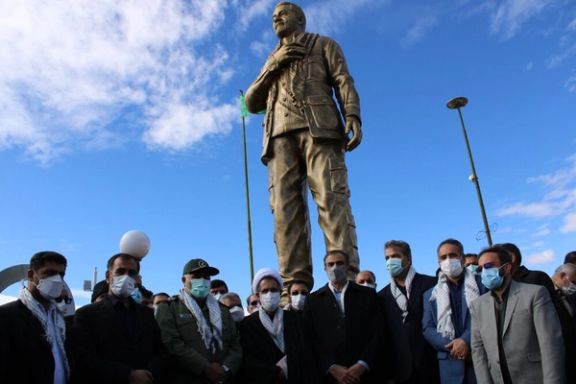
A memorial statue of Qasem Soleimani, the commander of Iran’s Revolutionary Guard Qods Force, was set on fire in the central city of Shahrekord on Wednesday.

A memorial statue of Qasem Soleimani, the commander of Iran’s Revolutionary Guard Qods Force, was set on fire in the central city of Shahrekord on Wednesday.
A video which surfaced on social media Wednesday night showed the statue burning.
The monument had been erected in one of the main squares of the city in the morning, concurrent with the nationwide ceremonies to mark the second anniversary of his death.
Soleimani, who was Iran’s top military and intelligence operator in the Middle East, was killed by a targeted US drone strike on January 3, 2020, directly ordered by former US president Donald Trump.
The representative of Supreme leader Ali Kamenei in the city described the people behind the political vandalism as “idiots”.
In September 2021, police arrested a man for torching another statue of Soleimani in the southwestern city of Yasuj, not very far from Shahrekord.
A few months before that, three young men in the city of Baneh were sentenced to a total of 16 years and seven months in prison for setting fire to a banner of Soleimani.
Many Soleimani busts and figurines have been unveiled by hardliners and supporters of the IRGC since his killing in January 2020.
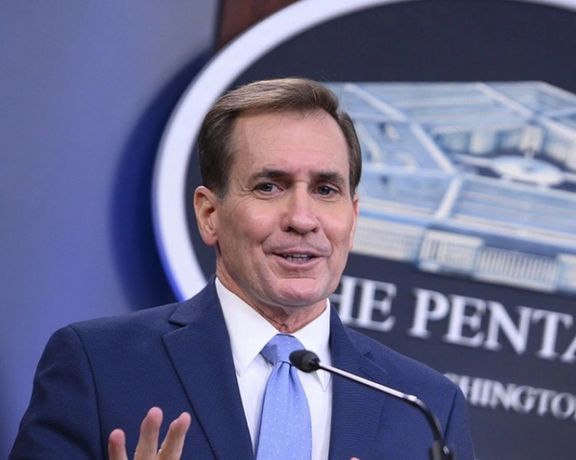
The United States says recent attacks on bases in Iraq and Syria that host American troops are typical of assaults by Iran-backed militia groups.
Pentagon Press Secretary John Kirby said in a briefing on Wednesday that Washington is mindful of the threat environment, and Iran knows how seriously we take the safety and security of our people and our mission in Iraq and Syria.
He admitted that the pace and frequency of such attacks have increased, noting that the reason can possibly be related to the anniversary of the strike that killed Qasem Soleimani and the change in the US mission in Iraq that officially transitioned to an advise and assist mission.
Iran-backed militia groups have said that change in the mission wasn't good enough, and that any presence beyond December 31st would be responded to… So, the result can be a confluence of all those things, Kirby said, stressing that no matter the reasons, the US was “preparing for the possibility of stepped-up attacks at the end of December.”
He added that the US military has increased its focus on the threat of rocket and drone attacks by Iran-back militia groups that “have become over time increasingly precise and increasingly lethal”.

A leading news website in Tehran says the current Majles is a "minority parliament" that should avoid provocative legislation opposed by most Iranians.
The ultra-conservative parliament has already annoyed a major part of the population by considering a bill to limit citizens access to the Internet and opposing a long-awaited pay adjustment for the country's low-paid teachers who have been taking to the streets in recent months, the moderate-conservative website, Khabar Online said.
The website added that insisting on ratifying radical laws will impose a high cost on the current Majles which has a weak voter base. Some lawmakers were elected by around 2 percent of their constituency's eligible voters.
Hundreds of reformist candidates were barred from candidacy in the 2020 election and ultra-conservatives virtually ran unopposed.
Based on a massive body of facts and figures, Khabar Online said that 38 of the lawmakers at the Majles have won between 2 to 10 percent of the votes in their constituencies. Two members won around 2 percent of the votes in their districts, while at least 3 lawmakers in this group chair various parliamentary committees despite their less than 10 percent voter base.
The next group includes 175 lawmakers who have won between 11 to 20 percent of the votes in their constituencies in the February 2020 parliamentary election. This is the largest group of lawmakers at the Majles, and Speaker Mohammad Bagher Ghalibaf who has won some 19 percent of the eligible votes in Tehran falls in this group.
The third group, which includes 77 lawmakers have won between 21 to 40 percent of the votes in their regions, while only two lawmakers managed to get 40 percent of eligible votes in their districts.
While the overall turnout of the 2020 election was announced as 42.5 percent, the actual turnout was far less due to the large number of void ballots. In some cities the number of votes won by the leading winner was less than the number of void ballots. According to Khabar Online, the reason for the low turnout, which was lowest in Tehran with just over 26 percent, was popular discontent over the bloody clampdown on the 2019 nationwide protests and barring reformist candidates from running in the election.
Last week, reformist newspaper Sharq examined the performance of the lawmakers and concluded that although the new Majles had promised to take on a predominantly supervisory role and control the presidential administration, it has done very little in this regard. According to one lawmaker who spoke on the condition of anonymity, the parliament’s performance was "unacceptable." The lawmaker criticized the ultraconservative parliament for "not being able to solve any of the country's economic problems, including its uncontrolled inflation."
Sharq quoted another lawmaker as having said that the Majles tables a large number of meaningless bills, "but some 95 percent of them are never being discussed, let alone being ratified." In August, the official news agency IRNA said that "over 300 bills were tabled by the lawmakers during the preceding 6 months often about insignificant matters."
At the same time, the Majles has failed to supervise President Ebrahim Raisi’s administration although more lawmakers have lately become vocal in their criticisms of the government.
According to Sharq, even Speaker Ghalibaf has called for less legislation, and demanded attaching more significance to the parliament's supervisory role. Nonetheless, last week, when lawmakers wanted to perform their supervisory role by impeaching the economy minister, it was Ghalibaf who stopped the motion.
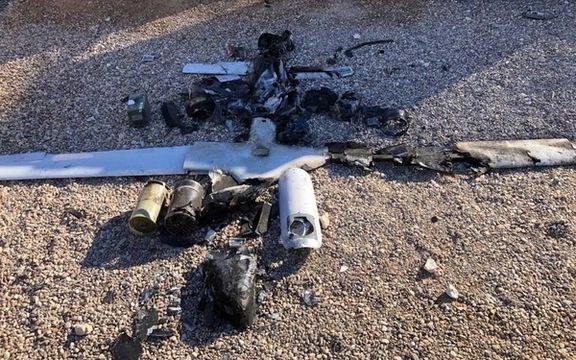
The US coalition operating in Syria and Iraq has condemned Iran for attacks on its bases as repeated strikes have hit sites near American forces in the region.
Maj. Gen. John W. Brennan, Jr., commander, Combined Joint Task Force - Operation Inherent Resolve said in a statement that the “inaccurate and indiscriminate indirect fire attacks pose a serious threat to innocent civilians because of their lack of discrimination”.
"The Coalition reserves the right to defend itself and partner forces against any threat, and will continue to do everything within its power to protect those forces," said Brennan. "Our Coalition continues to see threats against our forces in Iraq and Syria by militia groups that are backed by Iran. "
After the statement, Katyusha rockets hit Iraqi military bases hosting US forces near Baghdad's international airport and west of Baghdad on Wednesday, Iraqi military sources said.
Five rockets landed near Iraq's Ain al-Asad air base, which hosts U.S. and other international forces west of Baghdad, leaving no casualties, a coalition official told Reuters on Wednesday.
The closest impact was around 2 kilometers (1.2 miles) from the base, the official added. Iraqi army officials told Reuters the rounds fired were Katyusha rockets.
Iraqi security sources said there were no damage or casualties in both attacks.
The Iraqi military said that it started a search operation after "outlaw elements" fired five rockets which landed near the perimeters of the air base.
While there were no immediate claims of responsibility for recent attacks, Iraqi militia groups aligned with Iran vowed to retaliate for killing Soleimani and Iraqi militia commander Abu Mahdi al-Muhandis.
Wednesday's attack is the second one this week targeting the base near Baghdad's international airport after an attack by two drones was foiled on Monday.
The rocket attack near Ain al-Asad comes on day after two explosive-laden drones were also shot down on Tuesday by Iraq's air defenses as they approached the Ain al-Asad air base, which hosts U.S. forces, west of Baghdad.
US officials in recent weeks had warned of more attacks against in Iraq and Syria, in part because of the second anniversary of the killing of top Iranian general Soleimani.
Soleimani who was Iran’s top military and intelligence operator in the Middle East, organizing anti-American and anti-Israeli militant groups, was killed by a targeted US drone strike on January 3, 2020, directly ordered by former US president Donald Trump.
Iranian President Ebrahim Raisi said on Monday that Trump must face trial for the killing or Tehran would take revenge.
Separately, the US-led coalition said its forces had been targeted with eight rounds at the Green Village in Syria over the past 24 hours and while there were no casualties, the attack did cause minor damage.
"The Iran-supported malign actors fired on the Coalition and SDF (Syrian Democratic Forces) from within civilian infrastructure with no regard for civilian safety," the coalition said in a statement.
The statement added that the coalition responded by firing six artillery rounds and had earlier carried additional strikes.
On Wednesday, pro-Iran militia fighters fired shells toward a US base in eastern Syria's Al-Omar oil field in eastern Deir Ezzor region, causing damage but no casualties.
The attacks came as nuclear talks continued with Iran in Vienna that seem to be making some progress. Critics of the talks to restore the 2015 nuclear agreement known as JCPOA say that even if negotiations prove successful, they will not impact Iran's aggressive behavior in the region and its network of militant proxies attacking US and allied interests.
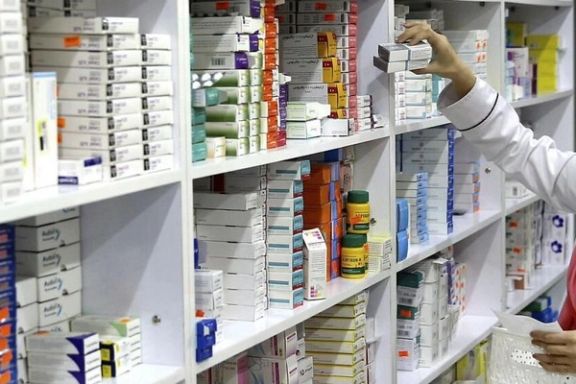
People from across Iran have sent audio messages to Iran International Television about the shortages and high prices of medicines and pharmaceutical products.
While Iranian officials claim there is no scarcity of medications, several Iranians from across the country have expressed their concerns about a lack of foreign medicines.
A citizen of Sardasht in West Azerbaijan told Iran International that the prices of a simple painkiller has increased over four times in recent months.
Another Iranian has talked about the sharp rise in the prices of simple cold medicines that increased about six times in recent weeks.
According to another citizens, most of the drugs which are not available in pharmacies are sold with higher prices in the black market.
In an audio file sent to Iran International, a citizen stressed that the Islamic Republic "has taken patients hostages."
This woman said that after six months since she registered her case with the Food and Drug Administration and the Red Crescent, now the medicine she needs is available, but at a price significantly higher than the normal price.
Last week, an official of Iran’s drug importers union saidgovernment claims of being self-sufficient in production of raw materials for medicines and pharmaceutical products is not true.
He also criticized government policies that led to the decrease in imports, warning that medication prices may rise dramatically in the coming months because of restrictions by the health ministry, not foreign sanctions. His comment referred to the fall in the value of Iran’s currency and the need for the government to provide subsidized dollars to importers.
The director-general of Drugs and Controlled Substances Department of Iran’s Health Ministry, Heidar Mohammadi, said in mid-December that if foreign currency is not provided for imports, shortages of medications will reach an alarming level in the upcoming months.
Noting that the number of unavailable drugs is about 40, he warned that unless the government provides cheap dollars, the list of unavailable drugs would hit 400 to 500 soon.
Iranian officials periodically try to blame United States' sanctions for shortages of medication, but in fact, food, health and humanitarian products are not sanctioned. Iran imports around 100 million euros of medicines a month just from Europe and also large quantities from China and India.
Just before the US pulled out of the 2015 nuclear agreement (JCPOA) in May 2018, the former Iranian president Hassan Rouhani decided to offer dollars at 42,000 rials for essential imports to keep food and medicine cheap. Current free market rate for dollars is 290,000 rials.
However, the subsidized dollars did little to keep prices low, simply due to the corruption ingrained in Iran’s supply chain. There are numerous exposed cases of companies applying to receive the cheap dollars to import essential commodities but pocketing huge profits by importing luxury goods, such as thousands of foreign cars.
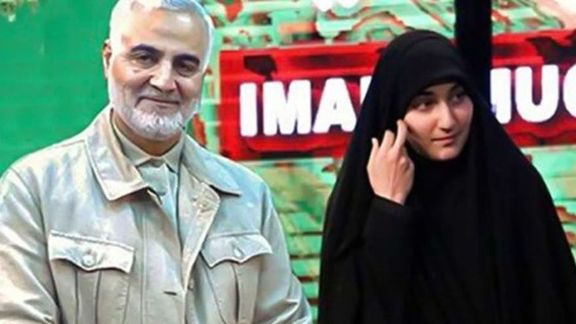
A photo of Qasem Soleimani’s daughter holding the latest iPhone 13 has led to a storm of criticism that overshadowed the second anniversary of her father’s death.
Hundreds of social media posts scorned Zeinab Soleimani for brandishing a phone that costs more than ten times the monthly salary of an ordinary employee in Iran while the Islamic Republic based its propaganda on Qasem Soleimani’s modest lifestyle.
To make matters worse, pictures of Zeinab's cell phone surfaced on social media on the same day the Islamic Republic's Supreme Leader called on the nation to avoid buying expensive American cell phones.
Both opponents and loyal supporters of the Islamic Republic asked why Soleimani's daughter should buy a cell phone which is expensive and manufactured by a major US company. A new iPhone is an item that most young Iranians should wait years before they can afford it, wrote moderate Rouydad24 website in Tehran.
In a bipolar situation on cyberspace, some Iranians criticized Zeinab for undermining her father's ideals and the regime's anti-US slogans. "If America is bad, why do you buy their cell phones,” they asked. Those at the other political extreme argued: "Iranian people have nothing against the people of America. US government's policies are bad, but the companies are privately owned."
Zeinab has kept silent about the controversy, but some hardline supporters tried to argue that the picture was photoshopped. Others proved them wrong in a matter of minutes using pirated cutting-edge software.
Some hardliners said the handset was a gift from Zeinab's husband, a Lebanese Hezbollah member. Opponents said if the husband could afford that, it means Iran’s money to the militant group is spent on personal luxuries.
Some other hardliners responded that Zeinab should nonetheless respect her father's ideals, adding that the picture has deeply disappointed the supporters of the Islamic revolution. Still others tried to defend her by claiming that the phone belonged to the young lady standing next to Zeinab in the picture.
Some social media users published pictures of Zeinab in other locationswith the same handset to prove that the phone belonged to her. However, most of those who criticized Zeinab, had nothing to say against the expensive phone. It was the hypocrisy and double-standards of some Iranian hardliners they were criticizing. Some people still remember that Iranians on social media lashed out at the hardlliner editor of Kayhan newspaper Hossein Shariatmadari a few months ago in his office where he wrote articles against the United States using the latest Apple computer.
Some Iranian social media users highlighted the luxurious lifestyle prevalent among the clerical community of Iran. This group of users mentioned the affluent lifestyle of former President Akbar Hashemi Rafsanjani's family and others, including owning expensive phones
Some other social media users asked if there is nothing wrong with purchasing US-made productss, why Supreme Leader Ali Khamenei banned COVID-19 vaccines from the United States last January.
Observers say Zeinab and her sister Narjess are certainly controversial figures to watch and follow. Narjess stirred controversy with her candidacy for Tehran City Council, although her father had barred her from running for political office when he was alive. Zeinab also created another controversy recently by reportedly donating $2 million to promote temporary marriage among Lebanese Shiites.